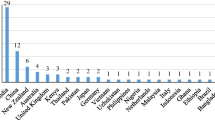Abstract
Current debate about organic farming emphasizes on the sustainability of farming systems, rural livelihood, and food quality on the technical and economic factors influencing the conversion to organic farming. The paper aims at describing the psychosocial adoption factors associated with institutional and technical support systems set up for the promotion of organic farming, based on a case study in Benin. We carried out this study in Djidja District in South Benin. We conducted semi-structured interviews with two leaders and five agricultural advisers from the Benin Organisation for Promoting Organic Agriculture and structured interviews with 100 farmers selected randomly among 255 organic farmers, 50 non-adopters to record why they did not adopt organic farming, and 25 farmers who reverted to conventional farming to understand their rationales. We used descriptive statistics and correlation for quantitative data analysis and discourse analysis for qualitative data analysis. We found that important factors that affected the adoption of organic farming were their perceptions of the characteristics of the technology, the economic factors, the institutional support for socio-technical learning networks, and the credit gained by the nongovernmental organization promoting organic farming. Farmers' needs for technical competence, social relatedness, and farm income safety acted as psychosocial mediators between the technical and institutional supports and their motivation to convert to organic farming. Alongside their technical abilities, the capacity of agricultural advisers to cope with psychosocial factors associated with the institutional support systems appears to be crucial in motivating farmers to adopt innovation.




Similar content being viewed by others
References
Alderfer CP (1969) An empirical test of a new theory of human needs. Organ Behav Hum Perform 4(2):142–175
Bengtsson J, Ahnström J, Weibull A-C (2005) The effects of organic agriculture on biodiversity and abundance: a meta-analysis. J Appl Ecol 42:261–269
Blais MR, Lachance L, Vallerand RJ, Brière NM, Riddle A (1993) Échelle de Motivation au Travail (ÉMT-31). Rev Québ de Psychol 14(3):185–215
Bolwig S, Gibbon P, Jone S (2009) The economics of smallholder organic contract farming in tropical Africa. World Dev 37(6):1094–1104
Bruckmeier K, Grund H, Symes D, Jansen AJ (1994) Perspectives for environmentally sound agriculture in East Germany: agricultural restructuring and rural change in Europe. Wageningen Sociologische Studies 37:180–194
Burton M, Rigby D, Young T (1999) Analysis of the determinants of adoption of organic horticultural techniques in the UK. J Agric Econ 50(1):47–63
Chouichom S, Yamao M (2010) Comparing opinions and attitudes of organic and non-organic farmers towards organic rice farming system in North-Eastern Thailand. J Org Syst 5(1):25–35
Cochet H. Etat des savoirs sur les mondes ruraux africains. Etudes Africaines/état des lieux et des savoirs en France. 1re Rencontre du Réseau des études africaines en France, 29–30 Novembre et 1er Décembre 2006, Paris; 2006
Conacher A, Conacher A. Organic farming in Australia. Geowest 18. The Department of Geography, University of Western Australia, Nedlands; 1982
Crucefix D. Organic agriculture and sustainable rural livelihoods in developing countries. Natural Resources and Ethical Trade Programme, UK; 1998
Darnhofer I, Schneeberger W, Freyer B (2005) Converting or not converting to organic farming in Austria: farmer types and their rationale. Agric Hum Values 22:39–52
Deci EL, Ryan RM (1985) Intrinsic motivation and self-determination in human behavior. Plenum, New York
Dima SJ, Odero AN (1997) Organic farming for sustainable agricultural production: a brief theoretical review and preliminary empirical evidence. Environ Resour Econ 10:177–188
Cranfield J, Henson S, Holliday J (2010) The motives, benefits, and problems of conversion to organic production. Agric Hum Values 27:291–306
Dubgaard A, Sorensen SN. Organic and biodynamic farming in Denmark: a statistical survey. Rapport, Statens-Jordbrugsokonomiske Institut 43, Denmark; 1988
Fairweather JR (1999) Understanding how farmers choose between organic and conventional production: results from New Zealand and policy implications. Agric and Hum Values 16:51–63
Ferrigno S, Ratter SG, Ton P, Vodouhe DS, Williamson S, Wilson J. Organic cotton: a new development path for African smallholders? The Gatekeeper Series 120. International Institute for Environment and Development, London; 2005
Fisher P. Barriers to the adoption of organic farming in Canterbury. M. Appl. Sci. Thesis, Centre for Resource Management, Lincoln College; 1989
Glin LC, Mol APJ, Oosterveer P, Vodouhe DS (2012) Governing the transnational organic cotton network from Benin. Global Networks 12(3):333–354
Guay F, Boggiano AK, Vallerand RJ (2001) Autonomy support, intrinsic motivation, and perceived competence: conceptual and empirical linkages. Personal Soc Psychol Bull 27(6):643–650
Herzfeld T, Jongeneel R (2011) Why do farmers behave as they do? Understanding compliance with rural, agricultural, and food attribute standards. Land Use Policy 29:250–260
Heaton S (2001) Organic farming, food quality and human health: a review of the evidence. Soil Association, Bristol
Hole DG, Perkins AJ, Wilson JD, Alexander IH, Grice PV, Evans AD (2005) Does organic farming benefit biodiversity? Biol Conserv 122(1):113–130
Hong CW. Organic farming and the sustainability of agriculture in Korea. Extension-Bulletin 388, ASPAC, Food and Fertilizer Technology Center; 1994
Kallas Z, Serra T, Gil JM (2010) Farmers' objectives as determinants of organic farming adoption: the case of Catalonian vineyard production. Agric Econ 41:409–423
Kvist M (1994) Evaluation of the grant to organic production. Jordbruksekonomiska Meddelanden 56(12):1302–1322
Losier GF, Vallerand RJ, Blais MR (1993) Construction et validation de l'Échelle des Perceptions de Compétence dans les Domaines de Vie (EPCDV). Sci et comport 23:1–16
Ministère de l’Agriculture de l’levage et de la Pêche (2010) Plan stratégique de relance du secteur agricole (PSRSA). Version Finale, Cotonou
Maslow A (1943) A theory of human motivation. Psychol Rev 50(4):370–396
McClelland DC (1961) The achieving society. Van Nostrand Reinhold, New York
Molder PJ, Negrave PD, Schoney RA (1991) Descriptive analysis of Saskatchewan organic producers. Can J Agric Econ 394(2):891–899
Negatu W, Parikh A (1999) The impact of perception and other factors on the adoption of agricultural technology in the Moret and Jiru Woreda (district) of Ethiopia. Agric Econ 21:205–216
OBEPAB. Rapport sur les accidents causés par les pesticides chimiques de synthèse utilisés dans la production cotonnière au Bénin. Cotonou; 2001
OBEPAB (2002) Le Coton au Bénin: Rapport de consultation sur le coton conventionnel et le coton biologique au Bénin, Rapport du Projet Pesticides Poverty and. Livelihoods PAN, UK
Olivier de Sardan J-P (1995) Anthropologie et développement, essai en socio-anthropologie du changement social. Karthala, Paris
Padel S (2001) Conversion to organic farming: a typical example of the diffusion of an innovation? Sociol Rural 41(1):40–61
Richer S, Vallerand RJ. Construction et validation de l'Échelle du sentiment d'appartenance sociale en milieu de travail. Communication présentée lors du congrès annuel de la SQRP, Ottawa, ON, 27–29 Octobre; 1995
Rigby D, Cáceres D (2001) Organic farming and the sustainability of agricultural systems. Agric Syst 68(1):21–40
Roussel P. La motivation au travail—Concept et théories. LIRHE Note no. 326. LIRHE, Toulouse; 2000
Sarker A, Itohara Y (2008) Factors influencing the extent of practice of organic farming technologies: a case study of Tangail district in Bangladesh. Am J Agric Biol Sci 3(3):584–590
Sinzogan, A. Facilitating learning toward sustainable cotton pest management in Benin: the interactive design of research for development. Ph.D. dissertation, Wageningen University; 2006
Svensson I. Governmental subsidy to organic farming 1989. A mail inquiry. Alternativ-Odling No. 7; 1991
Ton P, Tovignan S, Vodouhe S. Endosulfan deaths and poisonings in Benin. Pesticide News 47; 2000
Tovignan, DS. Gender perspectives in the adoption of organic cotton in Benin: a farm household modelling approach. PhD Dissertation, University of Giessen, Germany; 2005
Vanclay F (2004) Social principles for agricultural extension to assist in the promotion of natural resource management. Aust J Exp Agric 44(3):213–222
Vodouhe S. Le coton biologique, une chance à saisir pour l’Afrique pour un développement plus harmonieux. Abomey-Calavi; 1997
Willer H, Gillmor DA (1992) Organic agriculture in the Republic of Ireland. Ir Geogr 25(2):149–159
Acknowledgments
We would like to thank the International Foundation for Science (IFS) for financing this study.
Author information
Authors and Affiliations
Corresponding author
Rights and permissions
About this article
Cite this article
Moumouni, I., Baco, M.N., Tovignan, S. et al. What happens between technico-institutional support and adoption of organic farming? A case study from Benin. Org. Agr. 3, 1–8 (2013). https://doi.org/10.1007/s13165-013-0039-x
Received:
Accepted:
Published:
Issue Date:
DOI: https://doi.org/10.1007/s13165-013-0039-x




